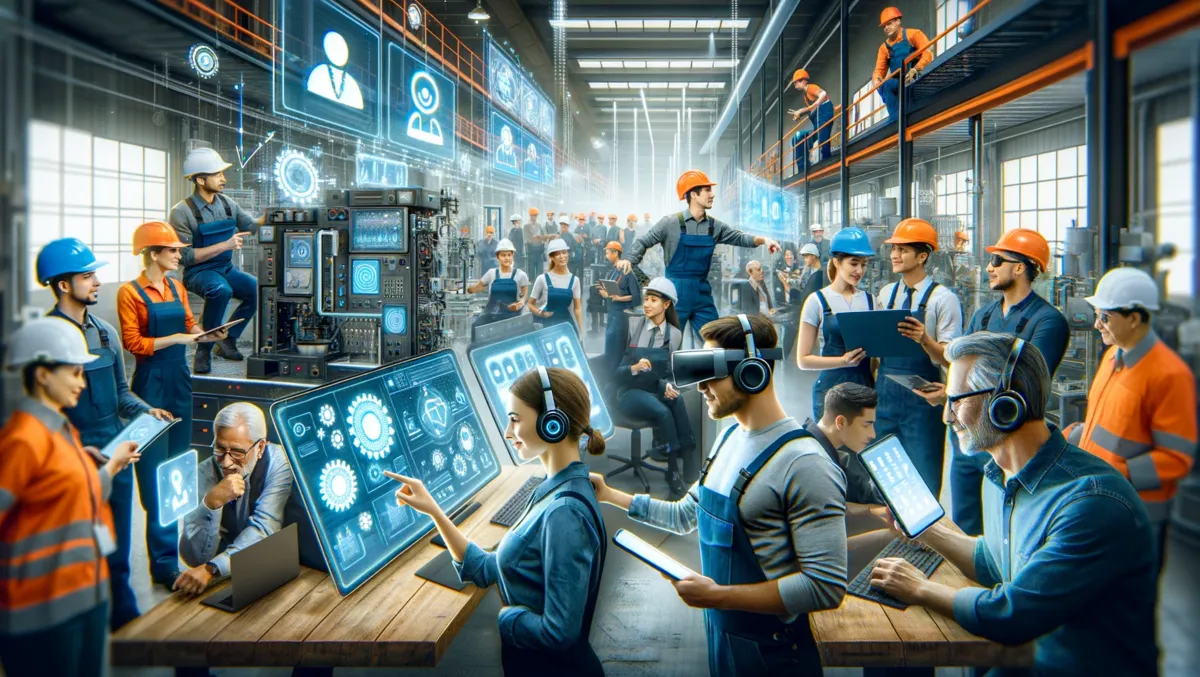
Embracing tech and AI: Nurturing optimism and mitigating concerns
The prospect of artificial intelligence (AI) has loomed over the workforce for years, often accompanied by apprehension and job security concerns. However, as the future unfolds, AI isn't just finding its place in various industries; it's gaining unexpected acceptance – among frontline workers. Recent data from across Australia, the UK, and the US unveils a shift in the narrative, revealing a workforce that's increasingly optimistic about the role of AI and technology in the workplace.
In our latest report, 'Feedback from the Field: Room for Improvement,' where we surveyed over 2,000 frontline workers, 50% expressed excitement about the prospect of AI training in their workplace. This enthusiasm is particularly prevalent among younger generations, indicating a growing acceptance of AI as a beneficial force. However, even as optimism rises, we need to acknowledge and address any lingering doubts and concerns about AI's impact on job stability and career paths.
Despite the overall optimism, the data also highlights a persistent worry among 46% of respondents who fear they'll lose their jobs if they don't adapt to new technologies. Strikingly, this concern is more pronounced among Baby Boomers, with 56% of the older generation less likely to adopt new apps for work compared to 71% of Millennials. This underscores the need for organisations to invest enough time and effort into helping older workers embrace and feel more confident in AI and emerging technologies.
I've spent over 18 years managing frontline teams in manufacturing and have contributed to the development of technology that simplifies frontline work, including AI applications. So, I've witnessed first-hand both the optimism and concern surrounding AI adoption. Both frontline workers and their leaders play an important role in ensuring AI and tech are met with optimism. Understanding the below key considerations will go a long way in any workplace, integrating both into their day-to-day operations successfully.
1. Boosting Efficiency and Productivity with AI
Productivity gains have long been touted as a significant advantage of AI and other technologies in the workplace, and the benefits extend to the frontline. Studies, including one conducted by MIT and Stanford at a tech company, revealed an impressive 14% improvement in worker productivity. AI's ability to automate or streamline routine tasks allows frontline workers to focus on responsibilities demanding hands-on skills and expertise.
2. Technology's Role in Enhancing Worker Support
Frontline workers, burdened by burnout concerns, are beginning to recognise technology as a support system rather than a threat. Research from Microsoft indicates that better technology ranks third on the list of factors that could reduce workplace stress for frontline workers, following better pay and vacation time. Leaders must leverage technology to provide meaningful support to their teams.
3. Intelligent Tech and Building Better Habits
When talking about AI, so much of the focus is on generative AI, like ChatGPT. But that's only the tip of the iceberg of what AI is capable of. It not only helps people work faster and smarter — it helps them work safer, too.
Examples include AI-driven trucks assisting drivers in developing safer driving habits and AI tools aiding healthcare providers in reducing overcrowding in intensive care units. Emphasising these positive impacts helps foster a more comprehensive understanding of AI's role in enhancing frontline operations and helping workers to focus on the positives that AI and technology can bring to their roles.
4. Encouraging AI Adoption: A Leadership Imperative
While enthusiasm for AI is growing, leaders must actively address doubts and facilitate a smooth transition. Clear communication about the benefits of AI, coupled with comprehensive training, is essential. In our report, 18% of frontline workers reported no organisation-provided training, highlighting a critical gap that needs to be filled to ensure successful technology adoption.
Research also shows that 55% of frontline workers have had to adapt to using digital tools on the fly, with no formal training or practice, and only 14% of frontline employees say they've received training to address how AI will change their jobs.
If you're going to offer new technologies, you need to be prepared to support that initiative with plenty of targeted training and resources. Frontline workers are eager for those learning opportunities, with 49% of employees saying they want to develop their skills.
5. Supporting Older Workers in Tech Adoption
Our survey found that nearly half (46%) of respondents worry that they could lose their jobs if they don't adapt to new technologies. This is more evident in the Baby Boomer generation, who were the least likely to adopt a new app where they could do everything they needed for work (56% of the older generation, compared to 71% of Millennials).
The apprehension among Baby Boomers underscores the importance of targeted efforts to support older workers in tech adoption. Organisations need to dedicate resources to build the confidence of this demographic, emphasising the value of embracing technology and dispelling concerns about potential job displacement.
AI and technology in the workplace are no longer a distant vision but a present reality, reshaping the frontline. As leaders, our responsibility is to communicate openly, equip our teams with the tools and training they need, and foster a future where AI and tech are seen as allies, not threats. Embracing this responsibility positions us to lead our frontline workforce into a future of work with fewer concerns and far more confidence.

